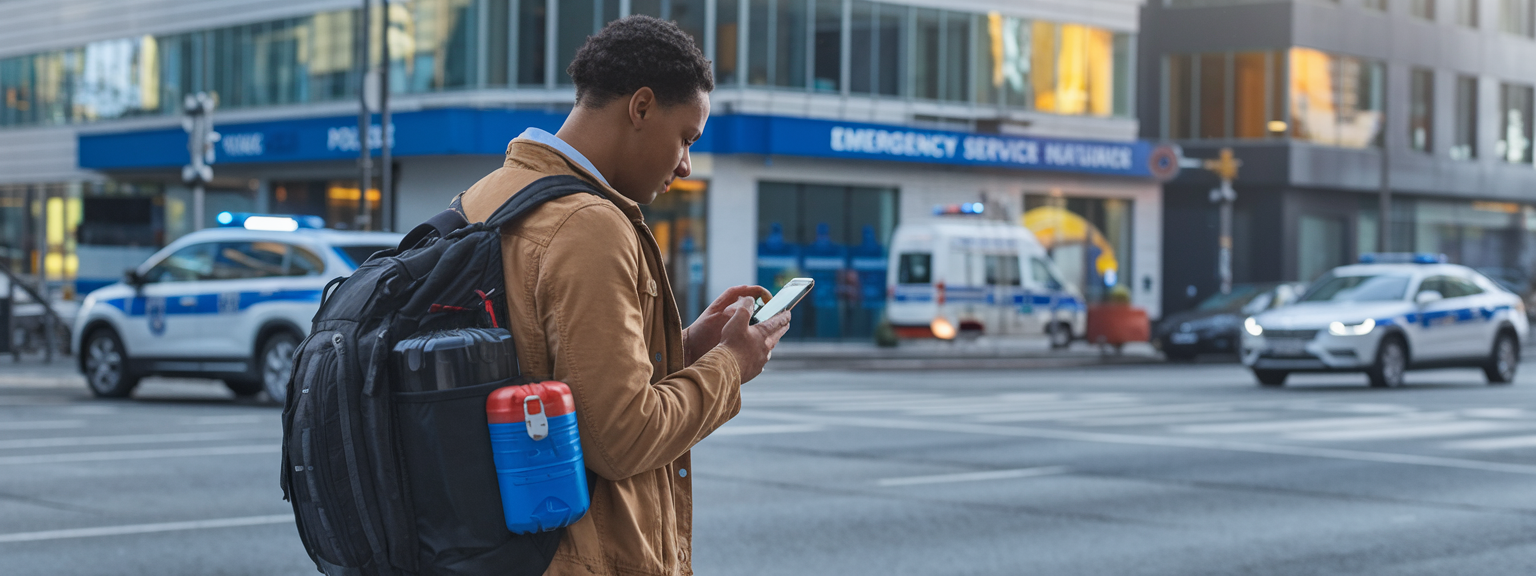Managing Travel Emergencies: Tips, Strategies, and Essential Resources
Travel emergencies can strike at any moment—whether it’s a sudden illness overseas, lost documents, or natural disasters disrupting your plans. Being well-prepared is essential for ensuring travel safety and peace of mind. In this guide, we explore practical emergency travel tips, discuss invaluable travel insurance insights, and outline comprehensive strategies for crisis management while abroad. If you’ve ever felt overwhelmed by the idea of managing travel emergencies, you are not alone. Here, we will help you build a robust preparedness plan that includes local support networks, critical emergency contacts, and insider advice that every traveler should know. By reading on, you will gain confidence and actionable tools to handle any unexpected situation with calm and clarity.
📍Must-See Attractions: Managing Travel Emergencies
When it comes to managing travel emergencies, knowing where to go in a crisis is absolutely crucial. This section highlights essential emergency resources that you should have on your radar before embarking on your journey. The following list covers key institutions and applications that provide real-time updates and life-saving support:
- Local Hospitals: Identify nearby hospitals or clinics with emergency care units. For example, major cities often have internationally accredited hospitals that accept foreign visitors. Always note down their addresses and contact details.
- Police Stations: Familiarize yourself with the locations and emergency phone numbers of local police stations. Many destinations offer dedicated tourist police offices ready to assist travelers in distress.
- Consulates & Embassies: List your own country’s consulate or embassy in the destination. These offices are critical for assistance with lost passports, legal matters, or if you need urgent evacuation support.
- Travel Safety Apps: Download reliable travel safety apps and sign up for real-time alerts and emergency notifications. Apps such as SmartTraveler and SafetyWing provide updated information on local risks and security measures.
- Safe Meeting Points: Many tourist destinations designate specific landmarks or safe zones where tourists can gather in case of emergencies. Check local tourism websites or hotel notices for these meeting points.
Additionally, high-quality images such as a well-equipped police station or an internationally recognized hospital sign can serve as useful visual references when reviewing emergency preparedness guides. Knowing your local emergency contacts ahead of time can significantly reduce anxiety and aid in swift crisis response.
🎭 Local Culture & Experiences: Managing Travel Emergencies
Understanding local culture and the way emergencies are handled can transform your approach to navigating a crisis. Different countries have varied protocols, and local communities often step in to ensure the safety of all residents and visitors.
Local Emergency Protocols
In many destinations, authorities rely not only on established emergency services but also on community support networks. For instance, in some European cities, neighborhood watch groups collaborate with local police, creating a rapid response system in case of sudden events. Recognizing the cultural emphasis on communal assistance can help you approach locals respectfully when asking for help.
Travel Anecdotes & Community Support
Multiple travelers have shared stories about how understanding local emergency etiquette made all the difference during their crises. One traveler from Asia recounted how a local community promptly organized a support group after an unexpected natural disaster. Another visitor highlighted how participating in local festivals, where safety drills are common, provided practical insights into evacuation procedures. These anecdotes underscore the importance of engaging with the community, as local insights can often reveal emergency contacts and locations that aren’t available online or in travel guides.
🔑 Hidden Gems & Insider Tips: Managing Travel Emergencies
When you’re facing an emergency abroad, insider tips can be the difference between a minor hiccup and a major disruption. This section gathers exclusive advice on avoiding common pitfalls and introduces lesser-known resources that many travelers overlook.
Insider Contacts & Volunteer Networks
Many destinations have non-profit organizations and volunteer networks dedicated to assisting stranded travelers or those caught in a crisis. Research local NGOs or embassy-recommended support groups, as they can often provide free or low-cost advice when traditional emergency services are overwhelmed. For instance, local volunteer groups sometimes offer translation services, which can be crucial when miscommunication exacerbates an emergency situation.
Leveraging Travel Insurance Effectively
Travel insurance is not just a safety net—it’s an essential tool in managing travel emergencies. Learn how to maximize your policy coverage by reading the fine print and understanding what services are included. Whether it’s hospitalization abroad, evacuation in case of natural disasters, or emergency legal assistance, knowing these details can boost your confidence and help you make informed decisions during a crisis.
Apart from the obvious measures, the best insider tips often include a mix of technological aids and community advice. For example, integrating local emergency apps with your travel itinerary and staying connected via social media groups can help you monitor any sudden changes in your destination’s safety profile. With this knowledge, you’re not just reacting to crises—you’re proactively preparing for them.
🗓️ Sample Itinerary or Day Plan
An effective daily routine can make a significant difference in managing travel emergencies. This sample day plan is designed to help you integrate safety checks and emergency preparedness into your travel schedule:
Morning: Awareness and Planning
Begin your day by reviewing local emergency contacts. Check your favorite travel safety apps, read local news or weather reports, and confirm that your travel insurance details are up-to-date. This small investment of time can save you from last-minute chaos.
Midday: Location and Resource Check
Around midday, consider visiting a nearby hospital, consulate, or tourist information center to get acquainted with local protocols. Even if you are not in immediate need, knowing the location of these facilities and gathering brochures or emergency maps can be invaluable.
Afternoon: Insurance Review and Briefing
In the afternoon, set aside some time to review your travel insurance policy. If available, attend a local briefing or workshop on safety procedures. This proactive approach ensures you’re aware of any time-sensitive measures or changes in emergency services.
Evening: Recap and Update
Conclude your day by recapping your safety measures. Confirm that all necessary emergency kits are updated, and double-check that important documents and contact information are secured. Use this quiet time to adjust your plans as necessary, ensuring you remain vigilant for the next day.
This sample itinerary not only reinforces your personal safety protocols but also integrates natural pauses to check up on the evolving local situation. Whether you’re spending your day exploring new attractions or relaxing at a local café, knowing that you have a safety plan in place can greatly enhance your travel experience.
💡 Travel Tips Specific to the Destination
Every destination comes with its unique set of challenges and opportunities when it comes to managing travel emergencies. The following travel tips are crafted to help you adapt your emergency preparedness to suit particular locations and cultural nuances.
Packing for Safety
When preparing for your journey, pack an emergency kit that includes a first aid package, multi-tool, copies of important documents, and additional cash in a secure pouch. Emphasize versatile clothing that offers protection against both harsh weather and unforeseen events. Remember, the more prepared you are, the less stressful any emergency situation will feel.
Cultural Etiquette in Crisis
Understanding and respecting local customs during emergencies can greatly influence how quickly you receive help. In many countries, politeness and adherence to local norms are not only appreciated but can expedite emergency assistance. Learn a few key phrases in the local language concerning help and location inquiries—it might just bridge the gap during a critical moment.
Optimizing Travel Insurance
A thorough comprehension of your travel insurance policy is paramount. Ensure that your coverage includes emergency evacuation, medical support, and assistance with lost travel documents. Sometimes, a minor oversight in policy details can lead to significant delays in obtaining help. Always carry a digital and printed copy of your policy to facilitate smoother interactions with service providers during a crisis.
When to Exercise Caution
Timing is critical. Certain times of the day or specific local events may increase the likelihood of encountering emergencies. Evaluate periods where security concerns might be heightened—such as political demonstrations, major festivals, or unpredictable weather changes—and plan accordingly. This foresight can serve as the difference between a manageable situation and a complete disruption of your travel.
By incorporating these tailored travel tips, you not only safeguard yourself but also add an extra layer of assurance for your companions. Preparing for the unexpected should be as intrinsic a part of your trip planning as booking accommodations or researching local cuisine.
Conclusion & Call to Action
In summary, managing travel emergencies is about more than just reacting to a crisis—it’s about building a mindset of preparedness and resilience. When you familiarize yourself with essential resources, embrace local emergency protocols, and adopt insider strategies, you not only enhance your travel safety but also gain the confidence to enjoy your adventures wholeheartedly. Being proactive, whether by setting up emergency contacts or frequently reviewing your travel insurance policies, can empower you to navigate even the most unexpected situations smoothly.
Your safety on the road is paramount, and spreading this knowledge can make a real difference. Whether you’re a seasoned explorer or preparing for your first international journey, every tip and strategy discussed here is designed to help you stay one step ahead of any crisis. Embrace the proactive mindset, equip yourself with the right tools, and transform challenges into opportunities for growth and enriching travel experiences.


![[Houston International Food Platter] [Vibrant platter of global dishes showcasing Houston international food]](https://roamwriters.com/wp-content/uploads/2025/11/houston-international-food-bold-flavors.png)
![[Cultural Etiquette International Meeting] [Colleagues exchanging greetings in an international office demonstrating Cultural Etiquette]](https://roamwriters.com/wp-content/uploads/2025/11/cultural-etiquette-international-meeting.png)

![[Travel Emergencies Response] [Traveler checking documents and phone for help after travel emergencies]](https://roamwriters.com/wp-content/uploads/2025/11/travel-emergencies-preparation-guide.png)